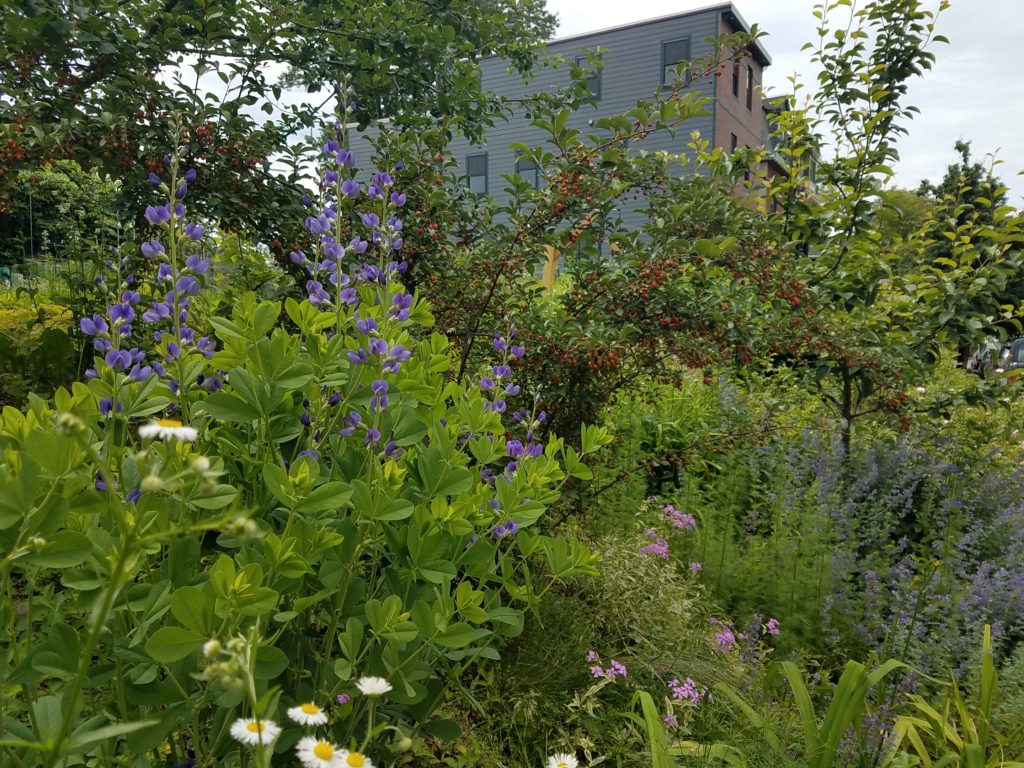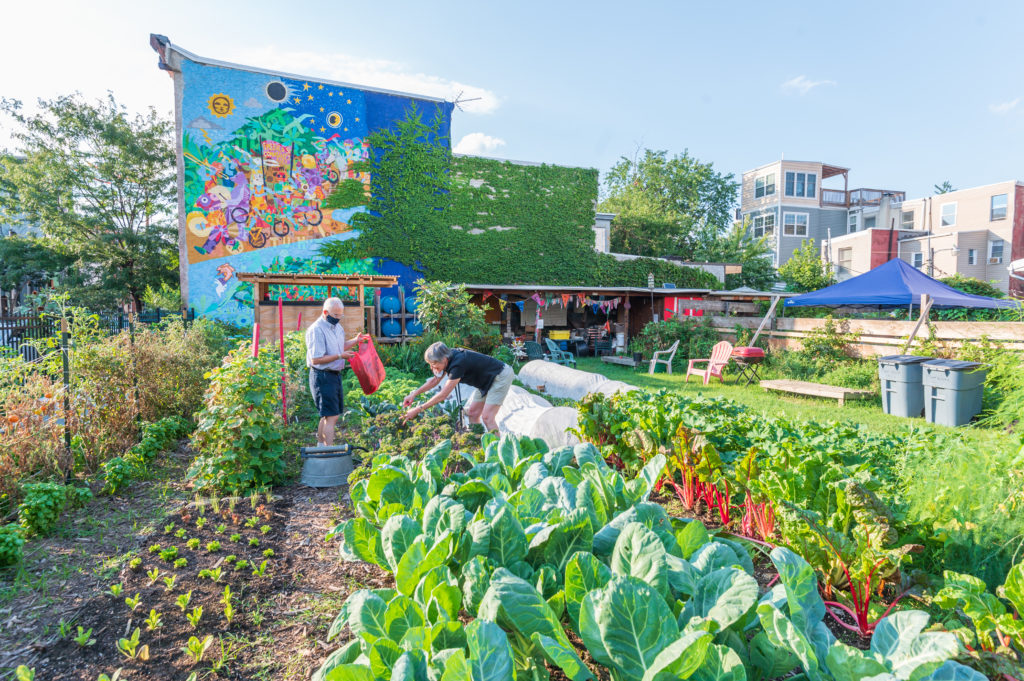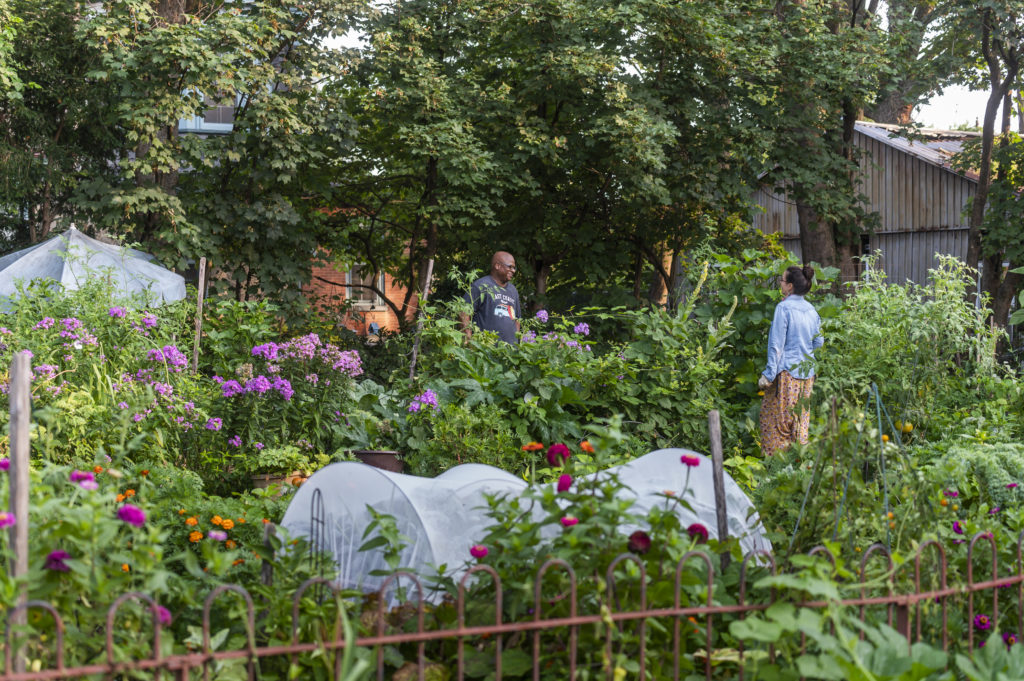Para leer esta publicación en español, haga clic aquí.
Did you know that there are over 400 community gardens in Philadelphia? And that many of these gardens are maintained by people and communities that do not own or have long-term legal access to the land? This can present legal challenges and risks for the gardeners and until recently, was an obstacle for partnering with the Philadelphia Orchard Project (POP).

For many years, POP required all orchard partner applicants to show proof of long-term, legal site access through ownership or a long-term lease. The rationale behind this requirement was that it can take five to ten years for orchard trees to mature and begin bearing fruit, and POP wanted to make sure its community partners would have access to the land at least long enough to be able to enjoy the fruit from the trees. But this has provided an impediment for some groups to partner with POP: systematic inequality, racially discriminatory practices, and increasing levels of development and rising property costs have impacted the ability of certain populations to access land and capital.
Based on these historic inequities, POP changed its partnership requirements in 2021 to allow for limited exceptions to be made to the long-term access requirement. POP now considers applications from community groups that do not have such access, recognizing that BIPOC (Black, Indigenous, and other People of Color) groups that have historically lacked resources or opportunities. With this change to the application process (described on the Orchard Planting page), POP will be able to partner with and support some groups that have ongoing relationships with land in their neighborhoods but don’t have long-term land security. Studies have shown that turning vacant lots into gardens reduces crime, increases neighborhood pride and community space, and of course, provides access to a local supply of healthy, fresh produce.
A recent WHYY article about POP’s partnership on a city-owned vacant lot in North Philadelphia highlighted “the struggle Philadelphia faces as it seeks to balance a booming market for housing with a community-based call for more green spaces in neighborhoods where trees and open space are in short supply.”

While POP now makes some limited exceptions to the long-term access requirement, it encourages those who wish to start a community garden or who currently maintain a garden, to begin the process of gaining legal access. Partnering with POP does not in itself provide any legal protection to land and many community orchards and community gardens have been lost to development in recent years. Long-term land access can be acquired through an agreement with the land owner or by starting the process to acquire full ownership. While POP cannot provide direct assistance, we offer the following guidance and list of resources to assist community groups in beginning the process to obtain legal access to their gardens.
Vacant lots are owned by the City, private individuals, or in most cases, a combination of both. Community groups can try to enter into formal or informal agreements with private owners or “interim use agreements” with the City that would give them the legal right to use the land for gardening.
The two main legal routes for acquiring ownership are adverse possession and the City’s Nominal Disposition Program. To make a successful adverse possession claim, an individual or organization has to show that it has possessed the land for at least 21 years, which can be difficult without photographs or access to records. If a non-profit organization acquires title through adverse possession, it won’t have to pay taxes but it may be liable for future taxes unless it can show it had non-profit status for the whole period of possession.
Through the City’s Nominal Disposition Program, nonprofit organizations can get title to, or a long-term lease on, City-owned property for nominal value. If the organization gets title, deed restrictions are placed on property that require the property to be used as a garden — and the property receives protections from development. While a group needs to have non-profit status to gain title through this program, the City has apparently allowed unincorporated non-profits to get ownership. A key element of success in this program is having the support of your district councilperson.

From legal toolkits to water discounts, there are many resources available to help community organizations “clean and green” vacant lots.
Starting the process for legal access to the land
- Grounded in Philly explains the risks of gardening on land you don’t have legal access to.
- Grounded in Philly provides guidance on how to start the process for getting legal access and ownership.
- “Grounded in Philly” también ofrece recursos sobre el uso de terrenos baldíos en español.
- The Neighborhood Gardens Trust can help preserve your land once you have an established garden (minimum of 3 years).
- The Garden Justice Legal Initiative offers pro bono legal support, advocacy, and community education to community gardens in Philadelphia.
Water resources
- The Philadelphia Water Department (PWD) explains how community gardens can access water in its Guide for Urban Farms & Gardens. They also offer discounts for nonprofits and community gardens on both stormwater fees and usage fees.
- Through PWD’s Rain Check program, you can learn about stormwater management and get a free water barrel!
- Grounded in Philly also has guidance in Resources for Water Access
Urban gardening tips and guidance
- Growing Safely in Urban Soil offers best practices for growing food safely in urban soil.
- The Pennsylvania Horticultural Society offers support and services for community gardens as well as year-round gardening programs.
- Grounded in Philly provides guidance on insurance for your community garden.
Community involvement and other support
- The Philadelphia Orchard Project has a Community Organizing Toolkit with recommendations and best practices for growing community involvement in the care and enjoyment of your garden.
- The Fairmount Park Conservancy provides financial, technical and on-the-ground support forurban farming/gardening initiatives through FarmPhilly.
- The Philadelphia Coalition for Affordable Communities has spear-headed the “Put Vacant Land in Community Hands” Land Justice campaign; POP is a member of this coalition and supports its goals to transfer city-owned vacant land to community control.
This blog post was written by POP Board Member Marci Green and Co-Executive Director Kim Jordan. Thank you to Neighborhood Gardens Trust for providing us with photos of recently-preserved gardens, and for your critical work in protecting these green spaces for community use!
SUPPORT US! If you found this entry useful, informative, or inspiring, please consider a donation of any size to help POP in planting and supporting community orchards in Philadelphia: phillyorchards.org/donate.